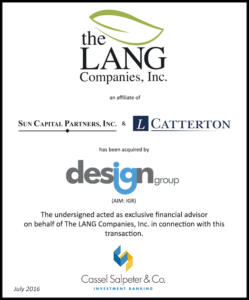MIAMI – June 6, 2016 – Cassel Salpeter & Co., a middle-market investment banking firm providing financial advisory services, served as exclusive financial advisor and facilitated a growth capital financing for Avenger Flight Group. The investment will enable the company to expand its services and geographic reach.
Avenger is a South Florida-based provider of commercial aviation simulation and training services to domestic and international airlines, using state-of-the-art simulators located in strategically convenient locations including: Fort Lauderdale; Las Vegas; Mexico City; and now Dallas.
The Cassel Salpeter team, led by Director Joseph “Joey” Smith and Vice President Marcus Wai, identified and approached Patriot Capital and Seacoast Capital, the private equity firms that provided the capital. Cassel Salpeter assisted Avenger through the closing of the transaction.
“We recognized that Avenger is a high-growth company in a unique and defensible sector within the commercial aviation industry and were eager to get involved with a company of this caliber and support its next phase of growth,” Smith said. “We enjoyed working with Avenger, Patriot, Seacoast and their excellent deal teams, and we look forward to our future collaboration.”
Cassel Salpeter, with its headquarters in Miami, has experience providing clients in diverse industries with a range of advisory services including: mergers and acquisitions; equity and debt capital raises; fairness and solvency opinions; valuations; and restructurings, such as 363 sales and plans of reorganization.
“We greatly appreciate Cassel Salpeter’s ability to understand our needs and move quickly to address them by finding the type of strategic partners we wanted: ones that would offer more than just capital,” said Avenger President and Founder Pedro Sors. “Patriot and Seacoast were able to quickly grasp the passion and vision for the future of the company. We are confident that this will be a long and successful relationship for all parties.”
The Patriot team was comprised of Managing Director Daniel Yardley, Senior Principal Charles Bryan, and Associate Jonathan Cope. “Patriot is excited to partner with Pedro and the Avenger team,” Yardley said. “We are very impressed with what they have been able to accomplish by focusing on delivering a best-in-class experience to their aviation partners and look forward to supporting them in their continued growth.”
Added Seacoast Partner Thomas Gorman: “Pedro Sors and his team at Avenger have built a unique and promising company that provides a critical service to the domestic and international commercial aviation industry and flight training community.” The Seacoast team was comprised of Partner Thomas Gorman and Associate David Romagnoli.
Salazar Jackson, LLP, Partner Linda Jackson supported Elsa Gagnon, Avenger Flight Group’s Vice President & General Counsel, in the transaction. John Evans and Chris Fowler of Moore & Van Allen PLLC represented Patriot Capital and Seacoast Capital.
About Cassel Salpeter & Co.
Cassel Salpeter & Co., LLC is an independent investment banking firm that provides advice to middle market and emerging growth companies in the U.S. and worldwide. Together, the firm’s professionals have experience providing private and public companies with a broad spectrum of investment banking and financial advisory services, including: mergers and acquisitions; equity and debt capital raises; fairness and solvency opinions; valuations; and restructurings, such as 363 sales and plans of reorganization. Co-founded by James Cassel and Scott Salpeter, the firm provides objective, unbiased, results-focused services that clients need to achieve their goals. Personally involved at every stage of all engagements, the firm’s senior partners have forged relationships and completed hundreds of transactions and assignments nationwide. The firm’s headquarters are in Miami. Member FINRA and SIPC. More information is available at www.CasselSalpeter.com.
About Avenger Flight Group
Avenger Flight Group is a provider of commercial aviation simulation and training. Avenger provides simulation training to domestic and international airlines using state of the art simulators located in strategically convenient locations in Ft. Lauderdale, Las Vegas, Mexico City and now Dallas, Texas. Avenger also provides classroom training for trainers and pilots. The company is led by an experienced management focused on meeting specific customer requirements in an environment dedicated to exceeding and surpassing all expectations. For more information, please visitwww.afgsim.com
About Patriot Capital
Patriot Capital is a leading source of growth capital for middle market companies seeking to finance business expansion, acquisitions, management buyouts or balance sheet recapitalizations. Patriot senior deal professionals each have more than 20 years of diverse corporate finance experience, providing companies with capital and seasoned business judgment for transactions. Patriot Capital utilizes a disciplined investment strategy developed over many years that focuses on capital preservation, consistent earnings growth and income generation. Patriot Capital has invested in and managed companies successfully through varying periods of economic expansion and contraction. Patriot understands and employs successful strategies and tactics needed to guide our companies through these periods.
For more information, please visit www.patriot-capital.com
About Seacoast Capital
Seacoast Capital invests mezzanine and equity capital in small, growing companies led by strong, entrepreneurial management teams. Seacoast invests in high quality U.S. businesses that are market leaders in our target industrial sectors of manufacturing, distribution, business services and industrial technologies. The investment opportunity may be an acquisition, management buyout or internal growth. Seacoast has a particular interest in companies located in underserved urban and rural markets. In all cases, Seacoast partners with managers who have proven track records and significant equity stakes. With over $300 million of funds under management and over 50 investments since 1994, Seacoast Capital is among the nation’s leading mezzanine investors in our target small company sector. Seacoast’s demonstrated ability to respond quickly and offer value beyond dollars makes Seacoast Capital an excellent financial partner. For more information, please visit www.seacoastcapital.com



 In my experience working with middle-market business owners, I have often observed that many of them underestimate the importance of having access to solid and timely financial information and support from great finance professionals to guide their daily decision-making and strategic planning. Having seen companies and managers suffer the consequences of this risky practice, I have confirmed that it is critical to have the right financial support and infrastructure in place.
In my experience working with middle-market business owners, I have often observed that many of them underestimate the importance of having access to solid and timely financial information and support from great finance professionals to guide their daily decision-making and strategic planning. Having seen companies and managers suffer the consequences of this risky practice, I have confirmed that it is critical to have the right financial support and infrastructure in place.

